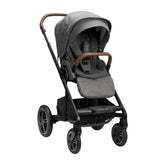Third Trimester: Week-By-Week What Happens in Pregnancy

The third trimester is a milestone many expectant parents eagerly anticipate. It's the final stretch before the arrival of your little one, and it comes with a whirlwind of physical, emotional, and exciting changes. As you approach this last stage of pregnancy, you may wonder about what to expect week by week. What symptoms should you watch for? How much weight should your baby gain? And most importantly, when does the third trimester officially begin?
In this article, we'll walk through the key developments and important information to know as you head into the third trimester of pregnancy, offering helpful guidance on how to navigate this exciting and sometimes overwhelming time.
What Weeks Are in the Third Trimester? When Does the Third Trimester Start: 27 or 28 Weeks?
The third trimester of pregnancy officially begins at week 28 and lasts until the end of week 40 (or until you give birth), according to the American Pregnancy Association. This is when your pregnancy transitions from the second trimester, and the real countdown to your baby's birth begins. By week 28, your baby has passed the critical development phases of the early trimesters, and now it's all about growing and preparing for life outside the womb.
The third trimester is a time of both excitement and anxiety for many parents. You may start preparing your home, attending more frequent doctor's visits, and thinking about your labor plan. Your healthcare provider will keep a close eye on your baby's development and your health as well. As you move through this phase, understanding the common third trimester weeks symptoms can help you anticipate and manage any discomforts or concerns.
Third Trimester Weeks in Months
To break it down more simply, the third trimester spans months 7, 8, and 9 of your pregnancy. Here's how the weeks align with months:
- Month 7 (Weeks 27-30): Your baby is growing rapidly and may even be able to open their eyes. By the end of this month, your baby will weigh between 2 to 3 pounds.
- Month 8 (Weeks 31-35): Expect to feel more pressure on your abdomen and pelvis. Your baby's organs are maturing, and they may start turning into the birth position.
- Month 9 (Weeks 36-40): Your baby is preparing for birth, gaining weight rapidly, and getting ready for delivery. You'll have more frequent doctor's visits to check on your progress.

Third Trimester Symptoms: What to Expect
As you enter the third trimester, you might notice new symptoms or a shift in the intensity of previous ones. Understanding these third trimester weeks symptoms can help you prepare for the changes ahead. Here are some common symptoms, according to the Cleveland Clinic:
- Increased Fatigue: The growing weight of your baby, along with hormonal shifts, can leave you feeling more tired than usual. It's important to rest as much as possible and listen to your body.
- Back and Pelvic Pain: As your baby grows, your body changes its posture to support the increased weight. This can lead to discomfort in your lower back and pelvis, especially as your baby settles lower into the birth canal.
- Frequent Urination: Your baby is getting bigger and putting pressure on your bladder. Frequent trips to the bathroom are common as you approach the end of pregnancy.
- Braxton Hicks Contractions: These practice contractions are your body's way of preparing for labor. They are usually irregular and don't signal the start of labor but can be uncomfortable.
- Swelling: You may notice swelling in your feet, ankles, and hands due to increased fluid retention in the third trimester. Elevating your feet and drinking plenty of water can help alleviate some of the discomfort.

Danger Signs of Pregnancy in the Third Trimester
While the third trimester can be an exciting time, it's also important to be aware of any potential danger signs of pregnancy in the third trimester. If you experience any of the following, it's crucial to seek medical attention immediately:
- Severe Abdominal Pain: Sharp, severe pain could be a sign of complications such as preterm labor or placental abruption.
- Severe Headache or Vision Changes: This could indicate a serious condition like preeclampsia, which requires prompt medical care.
- Sudden Swelling in Hands, Feet, or Face: While swelling is common, sudden, severe swelling could be a warning sign of preeclampsia.
- Heavy Bleeding or Spotting: Any bleeding should be reported to your healthcare provider immediately, as it could be a sign of placental issues.
- Decreased Fetal Movement: If you notice a decrease in your baby's movements, contact your doctor right away to ensure your baby is safe.

What Not to Do in Your Third Trimester of Pregnancy
While the third trimester is generally a time to focus on preparing for your baby, there are certain things you'll want to avoid to ensure a healthy pregnancy and safe delivery. Here are some important things not to do in your third trimester of pregnancy:
- Don't Skip Prenatal Appointments: It's important to keep your regular doctor's appointments in the third trimester. These check-ups allow your healthcare provider to monitor your baby's growth and address any concerns or complications early.
- Don't Overdo It with Exercise: While staying active is important, avoid overexerting yourself in the third trimester. Focus on gentle activities like walking, swimming, or prenatal yoga.
- Don't Engage in Risky Behaviors: Avoid activities that may increase the risk of injury or infection, such as heavy lifting, traveling to areas with disease outbreaks, or smoking.
- Don't Ignore Warning Signs: If you experience any concerning symptoms, such as spotting, swelling, or severe headaches, don't ignore them. Contact your healthcare provider to ensure everything is progressing safely.

Third Trimester Baby Weight: Average Growth
As your pregnancy progresses, you'll likely wonder about your baby's development, especially when it comes to how much your baby weighs. Here's a rough guide to what you can expect during each week of the final trimester:
- Week 28: By now, your baby is growing rapidly, and their weight may be around 2.5 pounds.
- Week 30: The baby will weigh about 3 pounds and begin to accumulate more body fat.
- Week 32: Your baby will be around 4 pounds and starting to fill out their skin with fat deposits.
- Week 36: Your baby might weigh about 5.5 to 6 pounds and continue to grow until birth.
- Week 40: The baby can weigh anywhere from 6 to 9 pounds, ready to make their grand entrance!

Which Trimester Is Most Critical?
While all trimesters are important, the third trimester is arguably the most critical for both you and your baby. It's the final stage where your baby is rapidly developing their organs, bones, and overall size. It's also the time when complications such as preterm labor can occur, making it crucial to pay attention to your health and seek medical care when necessary. Therefore, ensuring that you're following a healthy routine and staying vigilant during these final weeks will help you achieve a smooth and safe delivery.
Prepare for the Final Countdown with ANB Baby!
The third trimester of pregnancy is an exciting and sometimes challenging time. As your due date nears, it's important to stay informed about what to expect and how to prepare for labor and delivery. Whether you're navigating the changes in your body, addressing third trimester weeks symptoms, or learning about your baby's weight gain, understanding the process can help ease any anxiety and prepare you for the big day.
As you head into the final weeks of your pregnancy, consider shopping ANB Baby in-store and online for everything you need, from nursery supplies to feeding essentials. Prepare for your little one's arrival with confidence, knowing you have all the support you need from pregnancy to toddlerhood. Take charge of your journey into parenthood, and embrace the excitement and joy that comes with welcoming a new member into your family!









